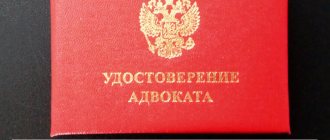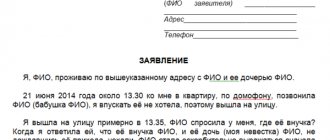ST 136 of the Criminal Code of the Russian Federation.
Discrimination, that is, violation of the rights, freedoms and legitimate interests of a person and citizen depending on his gender, race, nationality, language, origin, property and official status, place of residence, attitude to religion, beliefs, membership in public associations or any social groups, committed by a person using his official position, is punishable by a fine in the amount of one hundred thousand to three hundred thousand rubles, or in the amount of the wages or other income of the convicted person for a period of one to two years, or by deprivation of the right to hold certain positions or engage in certain activities. activities for a term of up to five years, or compulsory labor for a term of up to four hundred eighty hours, or correctional labor for a term of up to two years, or forced labor for a term of up to five years, or imprisonment for the same term.
Commentary to Art. 136 Criminal Code
1. The objective side of the crime is characterized by an action (inaction) called discrimination that violates equality in one (or more) of the individual characteristics specified in the article. Specific manifestations of discrimination may vary, but all of them must entail legally significant consequences for the victim.
2. The subjective side is characterized by direct intent; the motive of the crime is due to hostility towards another person due to the presence of one of the circumstances specified in the article.
3. Special subject: a person who uses his official position when committing a crime.
Administrative liability for violation of consumer rights
The essence: a fine in favor of the state for deceiving the consumer, infringement of his rights under the contract, poor quality of goods and services. Applies regardless of civil liability.
Who is at risk: sellers, performers, contractors, manufacturers, aggregators.
Who fines: Rospotrebnadzor after a scheduled inspection or consumer complaint. The fine can be appealed to the arbitration court.
The fines are:
— The product does not match the quality samples. Works and services not in accordance with GOSTs and technical regulations - from 10,000 to 20,000 rubles for individual entrepreneurs, from 20,000 to 30,000 rubles for organizations. In case of repeated violation, the fines are one and a half times higher, plus confiscation of goods - Art. 14.4 Code of Administrative Offenses of the Russian Federation.
— Weighing and calculating the client — from 3,000 to 5,000 rubles for individual entrepreneurs, from 20,000 to 50,000 rubles for organizations — part 1 of Art. 14.7 Code of Administrative Offenses of the Russian Federation.
— Deception about the properties and quality of a product for the purpose of sale — from 3,000 to 5,000 rubles for individual entrepreneurs, from 100,000 to 500,000 rubles for organizations — part 2 of Art. 14.7 Code of Administrative Offenses of the Russian Federation.
— There is no information about the product, manufacturer, seller, operating mode — from 5,000 to 10,000 rubles for organizations — part 1 of Art. 14.8 Code of Administrative Offenses of the Russian Federation.
- The terms of the contract with the consumer are worse compared to the law - from 10,000 to 20,000 rubles for organizations - part 2 of Art. 14.8 Code of Administrative Offenses of the Russian Federation.
- Failure to provide the client with the required benefit - from 5,000 to 10,000 rubles for organizations - part 3 of Art. 14.8 Code of Administrative Offenses of the Russian Federation.
— There is no acquiring terminal, if by law there must be one — from 30,000 to 50,000 rubles for organizations — part 4 of Art. 14.8 Code of Administrative Offenses of the Russian Federation.
- Violation of the rules for the sale of certain types of goods - from 300 to 1,500 rubles for individual entrepreneurs, from 10,000 to 30,000 rubles for organizations - Art. 14.15 Code of Administrative Offenses of the Russian Federation.
Example of administrative responsibility:
Rospotrebnadzor inspected the confectionery following a complaint from a customer. She claimed that the ingredients in the cake she purchased were not what was listed on the label.
Indeed, experts found almonds in the cake, although they were not listed in the description of the composition. And vice versa: bananas were not found, although they appear on the label.
The entrepreneur was fined 12,000 rubles in favor of the state under Art. 14.7 Code of Administrative Offenses of the Russian Federation.
Case No. A79-10262/2015
Second commentary to Art. 136 of the Criminal Code of the Russian Federation
1. This article acts as a criminal law guarantee of the constitutional principle of equality of citizens (Article 19 of the Constitution of the Russian Federation). The object of the crime is social relations and interests related to the implementation of this constitutional principle.
2. The objective side of this crime is expressed in the commission of an action (inaction) consisting of discrimination, i.e. in violation of the rights, freedoms and legitimate interests of a person and citizen, depending on his gender, race, nationality, language, origin, property and official status, place of residence, attitude to religion, beliefs, membership in public associations or any social groups.
3. The subject of the crime provided for in Article 136 of the Criminal Code of the Russian Federation is a person using his official position, i.e. an official, or a person performing managerial functions in a commercial or other organization, or another employee (of a local government body, a commercial or non-profit organization).
4. Subjective side - guilt in the form of direct intent.
Civil liability for violation of consumer rights
The essence: payments to the consumer for low-quality goods and poor service. The liability applies in conjunction with the underlying obligation, for example to return the marriage fee.
Who is at risk: sellers, contractors, manufacturers, aggregator sites.
Who decides how much and what to pay: the entrepreneur must pay the client according to his application. If he doesn’t, the court will force him to pay.
The payments are:
Losses
Losses - any expenses of the client that arose as a result of:
- Purchasing a defective item, ordering a low-quality service - Art. 18 and art. 29 of the Law.
- Damage to property, harm to health or death of a person due to a defect in a product or service - Art. 7 and art. 14 of the Law.
- Incomplete or incorrect description of the goods, errors in price - Art. 12 of the Law.
- Infringement of his rights by the contract in comparison with the law - Art. 16 of the Law.
- Lack of the ability to pay by card, when by law the store is required to have a terminal - Art. 16.1.Law.
- Loss or damage to the material that he transferred to the performer - Art. 35 of the Law.
Moral injury
Money for moral damage to the client is due if the seller has violated something - Art. 15 of the Law. The size is agreed upon. In case of a dispute, the court will decide.
Penalty
The seller, manufacturer, performer pays the client a penalty for violating the following terms:
— Refunds for defective goods or warranty repairs at 1% of the price of the goods per day - Art. 23 Laws.
- Transfer of paid goods at 0.5% of the advance payment per day - Art. 23.1 of the Law.
- Performing work or modifications at 3% of the price of work per day - Art. 28 of the Law.
Penalty in favor of the consumer
If the client turned to the seller, manufacturer or aggregator with a monetary demand, was refused, but the court sided with him, the defendant pays a fine in the amount of half of the awarded amount - Art. 13 of the Law.
Example of civil liability:
The man had his car's engine chip-tuned at a car service center and installed a new exhaust system for 133,500 rubles.
After some time, the car engine stopped. I had to take the car to another service center. There it turned out that the tuning and installation were done poorly. We had to spend 270,500 rubles on repairs.
The man demanded expenses from the car service center. He was refused, and he went to court.
The court supported the customer and ordered the car service to pay:
— refund of payment — 133,500 rubles.
- losses - 270,500 rubles for repairs, 66,000 rubles for examination of defects.
— penalties for returning payment late — 133,500 rubles.
— moral damage — 5,000 rubles.
— a fine in favor of the consumer for refusing to resolve the money issue peacefully — 271,250 rubles.
— lawyer’s fees — 20,000 rubles.
Case No. 33-39471/2018
Third commentary to Article 136 of the Criminal Code of the Russian Federation
1. Article 19 of the Constitution of the Russian Federation enshrines the guarantee of equality of rights and freedoms of man and citizen, regardless of gender, race, nationality, language, origin, property and official status, religion, etc. The law prohibits any restrictions on human rights and freedoms based on social, racial, national or other affiliation. Criminal law ensures compliance with the constitutional principle of equality. Any citizen whose equality of rights has been violated can be considered victims.
2. The corpus delicti is formal, the moment of completion is associated with the beginning of the implementation of the actions specified in the law.
3. The objective side is characterized by an action that is regarded as discrimination, i.e. violation of the rights, freedoms and legitimate interests of a person and citizen depending on his gender, race, nationality, language, origin, property and official status, place of residence, attitude to religion, beliefs, membership in public associations or any social groups. A violation of equality consists in the fact that a citizen, on the grounds specified specifically in Art. 136, deprive him of his right or do not provide him with the opportunity to exercise his right or create obstacles in the exercise of this right (for example, illegal dismissal from work in connection with the active participation of a citizen in the activities of one of the public associations, unjustified refusal to rent residential premises on the basis of his attitude to religion and etc.).
4. The subjective side is characterized by guilt in the form of direct intent. The perpetrator realizes that he is violating the equality of citizens and wants to act that way. A mandatory feature of this crime is a motive - an incentive to violate the equality of citizens because of an unfriendly attitude towards his gender, race, nationality, language, origin, property or official status, attitude towards religion, beliefs or membership in public associations.
5. The subject of the crime is a special one, a person using his official position.
It is necessary that the guilty person violates the equality of citizens by using his official position. We can talk not only about an official using his powers, but also about other entities who discriminate within the framework of their official powers. ‹ Chapter 19. Crime against the constitutional rights and freedoms of man and citizenUp Article 137. Violation of privacy ›
Federal Law of December 28, 2012 No. 272-FZ
RUSSIAN FEDERATION
THE FEDERAL LAW
On measures of influence on persons involved in violations of fundamental human rights and freedoms, the rights and freedoms of citizens of the Russian Federation
Adopted by the State Duma on December 21, 2012
Approved by the Federation Council on December 26, 2012
(As amended by federal laws dated May 23, 2015 No. 129-FZ, dated March 28, 2017 No. 35-FZ, dated December 27, 2018 No. 555-FZ, dated December 2, 2019 No. 394-FZ, dated December 30, 2020 No. 481-FZ, dated December 30, 2020 No. 482-FZ, dated June 28, 2021 No. 230-FZ)
Article 1
Measures of influence on persons involved in violations of fundamental human rights and freedoms, the rights and freedoms of citizens of the Russian Federation include:
1) ban on entry into the Russian Federation for citizens of the United States of America:
a) those involved in violations of fundamental human rights and freedoms;
b) who have committed crimes against citizens of the Russian Federation who are abroad, or who are involved in their commission;
c) vested with state powers and who, through their actions (inaction), contributed to the release from liability of persons who have committed crimes against citizens of the Russian Federation or those involved in their commission;
d) whose official duties included making decisions, the absence or presence of which led to the release from liability of persons who committed crimes against citizens of the Russian Federation or were involved in their commission;
e) those involved in the abduction and illegal imprisonment of citizens of the Russian Federation;
f) who passed unfounded and unfair sentences against citizens of the Russian Federation;
g) carrying out unjustified legal persecution of citizens of the Russian Federation;
h) who made unfounded decisions that violated the rights and legitimate interests of citizens and organizations of the Russian Federation;
2) arrest on the territory of the Russian Federation of financial and other assets of citizens of the United States of America who are prohibited from entering the Russian Federation, and a ban on any transactions with the property and investments of these citizens.
Article 2
1. The list of citizens of the United States of America who are prohibited from entering the Russian Federation, and organizations whose activities are suspended in accordance with Article 3 of this Federal Law, is maintained by the federal executive body exercising the functions of developing and implementing state policy and legal regulation in sphere of international relations of the Russian Federation.
2. In relation to citizens of the United States of America included in the list provided for in Part 1 of this article:
1) a ban is established on the disposal of property located on the territory of the Russian Federation;
2) the activities of legal entities under their control on the territory of the Russian Federation are suspended;
3) powers (membership) in boards of directors or other management bodies of organizations registered on the territory of the Russian Federation are suspended.
3. Proposals to amend the list provided for in Part 1 of this article may be submitted to the federal executive body exercising the functions of developing and implementing state policy and legal regulation in the field of international relations of the Russian Federation, by members of the Federation Council of the Federal Assembly of the Russian Federation , deputies of the State Duma of the Federal Assembly of the Russian Federation, the Commissioner for Human Rights in the Russian Federation, political parties, the Public Chamber of the Russian Federation, as well as government bodies.
4. The procedure for maintaining the list provided for in Part 1 of this article is determined by the federal executive body exercising the functions of developing and implementing state policy and legal regulation in the field of international relations of the Russian Federation.
5. The head of the federal executive body exercising the functions of developing and implementing state policy and legal regulation in the field of international relations of the Russian Federation, at least once a year, informs the chambers of the Federal Assembly of the Russian Federation about the progress of implementation of this Federal Law.
Article 21
1. An individual, regardless of his citizenship or in the absence thereof, may be recognized as an individual performing the functions of a foreign agent if he acts on the territory of the Russian Federation in the interests of a foreign state, its government bodies, an international or foreign organization, foreign citizens or stateless persons (hereinafter referred to as a foreign source) political activity and (or) targeted collection of information in the field of military, military-technical activities of the Russian Federation, which, if received by a foreign source, can be used against the security of the Russian Federation (in the absence of signs of crimes under Articles 275 and 276 of the Criminal Code of the Russian Federation), in connection with the influence exerted on him by a foreign source or citizens of the Russian Federation, Russian organizations acting in the interests of a foreign source, expressed in support of these types of activities (including the provision of funds, other property or organizational and methodological assistance ). The list of information in the field of military, military-technical activities of the Russian Federation, which, if received by a foreign source, can be used against the security of the Russian Federation, is determined by the federal executive body in the field of security.
Political activity is recognized as activity in the field of state building, protecting the foundations of the constitutional system of the Russian Federation, the federal structure of the Russian Federation, protecting the sovereignty and ensuring the territorial integrity of the Russian Federation, ensuring legality, law and order, state and public security, national defense, foreign policy, socio-economic and national development of the Russian Federation, the development of the political system, the activities of state bodies, local government bodies, legislative regulation of the rights and freedoms of man and citizen in order to influence the development and implementation of public policy, the formation of state bodies, local government bodies, their decisions and actions.
Political activity is carried out in the following forms:
participation in the organization and conduct of public events in the form of meetings, rallies, demonstrations, processions or pickets or in various combinations of these forms, organization and conduct of public debates, discussions, speeches;
participation in activities aimed at obtaining a certain result in elections, referendums, in monitoring the conduct of elections, referendums, the formation of election commissions, referendum commissions, in the activities of political parties;
public appeals to state bodies, local government bodies, their officials, as well as other actions influencing the activities of these bodies, including those aimed at adopting, amending, repealing laws or other regulatory legal acts;
dissemination, including using modern information technologies, of opinions on decisions made by government bodies and policies pursued by them;
formation of socio-political views and beliefs, including through conducting public opinion polls and publishing their results or conducting other sociological research;
involvement of citizens, including minors, in these activities;
financing of these activities.
Political activities do not include activities in the field of science, culture, art, healthcare, prevention and protection of the health of citizens, social services, social support and protection of citizens, protection of motherhood and childhood, social support for the disabled, promotion of a healthy lifestyle, physical education and sports, protection of flora and fauna, charitable activities.
2. An individual whose activities fall under the criteria specified in Part 1 of this article is obliged, in the manner established by the federal executive body exercising the functions of developing and implementing state policy and legal regulation in the field of registration of non-profit organizations, to submit an application for inclusion in the list of individuals performing the functions of a foreign agent. An individual who is not a citizen of the Russian Federation, permanently residing outside the territory of the Russian Federation, intending, after arriving in the Russian Federation, to carry out activities related to performing the functions of a foreign agent, is obliged to notify the federal executive body performing the functions of this before entering the Russian Federation. on the development and implementation of state policy and legal regulation in the field of registration of non-profit organizations, in the manner established by it.
3. Based on the information provided in the manner prescribed by Part 2 of this article, the federal executive body exercising the functions of developing and implementing state policy and legal regulation in the field of registration of non-profit organizations maintains a list of individuals performing the functions of a foreign agent, which is publicly available on the Internet information and telecommunications network. The procedure for maintaining and posting this list on the Internet information and telecommunications network is established by the specified body. In case of identification of the activities of an individual performing the functions of a foreign agent who has not submitted an application (notification) in the manner established by Part 2 of this article, the federal executive body exercising the functions of developing and implementing state policy and legal regulation in the field of registration of non-profit organizations, includes this person in the list of individuals performing the functions of a foreign agent. The decision to include in the list of individuals performing the functions of a foreign agent can be appealed in court.
4. The following are exempt from the obligation to submit an application for inclusion in the list of individuals performing the functions of a foreign agent:
1) employees of diplomatic missions, employees of consular offices of foreign states in the Russian Federation, as well as representatives of foreign government bodies and international organizations located on the territory of the Russian Federation by official invitation;
2) foreign journalists accredited in the Russian Federation, including those recognized as foreign media outlets performing the functions of a foreign agent, in accordance with the legislation of the Russian Federation on mass media;
3) other persons by decision of the federal executive body exercising the functions of developing and implementing state policy and legal regulation in the field of registration of non-profit organizations, adopted in the manner established by it in agreement with the federal executive bodies in the field of security, in the field of state security, in the field of foreign intelligence, in the field of defense.
5. In the event that a foreign journalist accredited in the Russian Federation carries out activities related to the performance of the functions of a foreign agent, incompatible with his professional activities as a journalist, the federal executive body exercising the functions of developing and implementing state policy and legal regulation in the field of registration non-profit organizations, includes such a person in the list of individuals performing the functions of a foreign agent.
6. An individual included in the list of individuals performing the functions of a foreign agent is obliged to submit at least once every six months to the federal executive body that carries out the functions of developing and implementing state policy and legal regulation in the field of registration of non-profit organizations, or its territorial body a report on its activities related to the performance of the functions of a foreign agent, including information on the purposes of spending funds and using other property received from foreign sources, and on their actual expenditure and use. The form and procedure for submitting the report are established by the federal executive body exercising the functions of developing and implementing state policy and legal regulation in the field of registration of non-profit organizations.
7. An individual included in the list of individuals performing the functions of a foreign agent is obliged to indicate the presence of this status when carrying out activities related to performing the functions of a foreign agent, including when contacting state bodies, local governments, public associations, educational organizations. Materials published and (or) distributed by an individual included in the list of individuals performing the functions of a foreign agent, information relating to the activities of this individual in connection with the performance of the functions of a foreign agent, distributed through the media, must be accompanied by an indication that that these materials (information) were published and (or) distributed by an individual performing the functions of a foreign agent, or relate to the activities of this individual.
8. An individual included in the list of individuals performing the functions of a foreign agent cannot be appointed to positions in state bodies and local governments.
9. In the event of termination of activities related to the performance of the functions of a foreign agent, an individual has the right to submit to the federal executive body exercising the functions of developing and implementing state policy and legal regulation in the field of registration of non-profit organizations, or its territorial body, a petition for exclusion from the list of individuals performing the functions of a foreign agent. Within 60 days from the date of receipt of the said petition, the federal executive body exercising the functions of developing and implementing state policy and legal regulation in the field of registration of non-profit organizations, or its territorial body, makes a decision to exclude an individual from the list of individuals performing the functions foreign agent, or makes a reasoned decision to refuse to exclude him. The form of a petition to exclude an individual from the list of individuals performing the functions of a foreign agent is approved by the federal executive body responsible for the development and implementation of state policy and legal regulation in the field of registration of non-profit organizations.
(Article introduced - Federal Law dated December 30, 2020 No. 481-FZ)
Article 3
1. In accordance with this Federal Law, the activities of non-profit organizations that participate in political activities carried out on the territory of the Russian Federation and receive funds and other property free of charge from citizens (organizations) of the United States of America or implement projects, programs or carry out other activities that pose a threat to the interests of the Russian Federation are suspended by the federal executive body exercising the functions of developing and implementing state policy and legal regulation in the field of registration of non-profit organizations. The federal executive body, which carries out the functions of developing and implementing state policy and legal regulation in the field of registration of non-profit organizations, sends information about non-profit organizations whose activities are suspended to the federal executive body, which carries out the functions of developing and implementing state policy and normatively -legal regulation in the field of international relations of the Russian Federation.
2. A citizen of the Russian Federation who has the citizenship of the United States of America cannot be a member or head of a non-profit organization, its structural unit or a structural unit of an international or foreign non-profit organization (branch, branch or representative office) participating in political activities carried out on the territory of the Russian Federation . Violation of this prohibition entails the suspension by the federal executive body, which carries out the functions of developing and implementing state policy and legal regulation in the field of registration of non-profit organizations, of the activities of the specified non-profit organization (structural unit).
3. In case of suspension of the activities of a non-profit organization (structural unit) in accordance with parts 1 and 2 of this article, its rights as the founder of the mass media are suspended, it is prohibited from organizing, holding mass actions and public events, participating in them, using bank accounts and deposits , with the exception of settlements for economic activities and employment contracts, compensation for losses caused by its actions, payment of taxes, fees and fines. In relation to the property of non-profit organizations (structural divisions), the activities of which are suspended in accordance with parts 1 and 2 of this article, the decision to seize it is made by the court upon the application of the federal executive body exercising the functions of developing and implementing state policy and legal norms. regulation in the field of registration of non-profit organizations. (As amended by Federal Law No. 129-FZ dated May 23, 2015)
4. In the event that a non-profit organization, whose activities have been suspended in accordance with this Federal Law, stops receiving funds and other property free of charge from citizens (organizations) of the United States of America or stops implementing projects, programs or carrying out other activities on the territory of the Russian Federation that pose a threat to the interests of the Russian Federation, the activities of such an organization are resumed by decision of the federal executive body exercising the functions of developing and implementing state policy and legal regulation in the field of registration of non-profit organizations.
Article 31
1. Activities of a foreign or international non-governmental organization that pose a threat to the foundations of the constitutional system of the Russian Federation, the defense capability of the country or the security of the state, including those that promote or hinder the nomination of candidates, lists of candidates, the election of registered candidates, the initiation of a referendum and the conduct of a referendum, the achievement of a certain result in elections, referendums (including participation in other forms in election campaigns, referendum campaigns, with the exception of participation in election
Criminal liability for violation of consumer rights
The bottom line: a fine to the state or a prison sentence for unsafe goods and services if people were hurt or killed because of them. Applies regardless of civil liability.
Who is at risk: a specific person - the director of a company or an entrepreneur.
Who decides: first, investigators initiate a criminal case under Art. 238 of the Criminal Code of the Russian Federation and prove the guilt of the accused of a crime. Then the materials are sent to the court for sentencing.
The punishment is:
Trade, provision of services and performance of work in non-compliance with safety requirements or forgery of quality documents - from a fine of 300,000 rubles to ten years in prison under Art. 238 of the Criminal Code of the Russian Federation.




